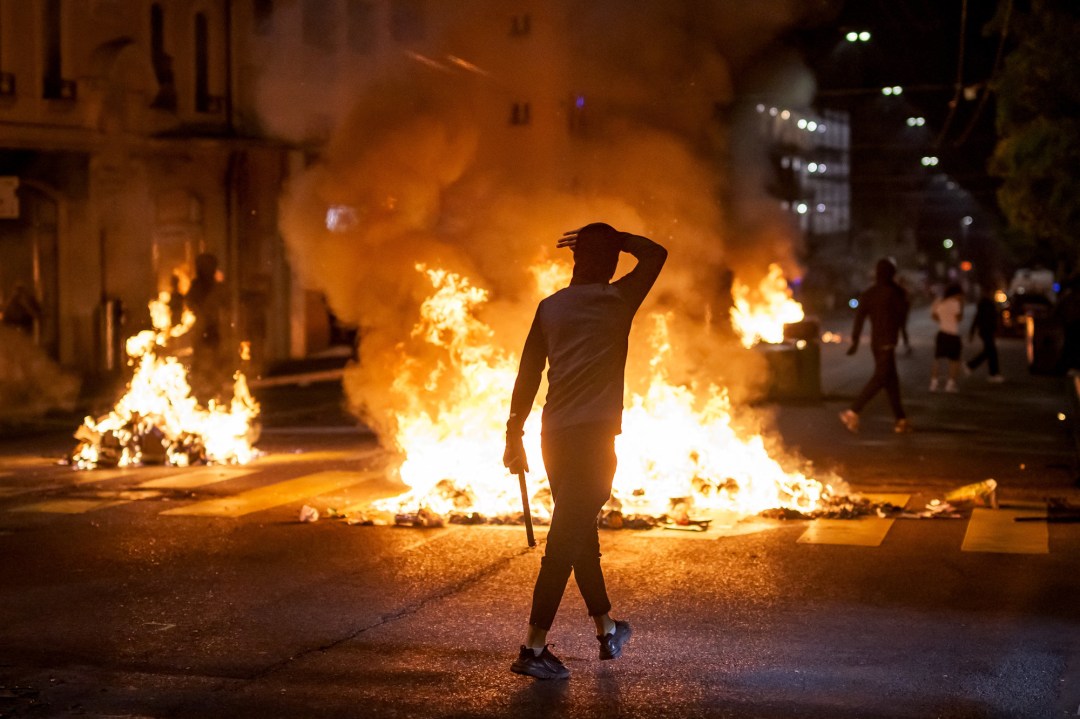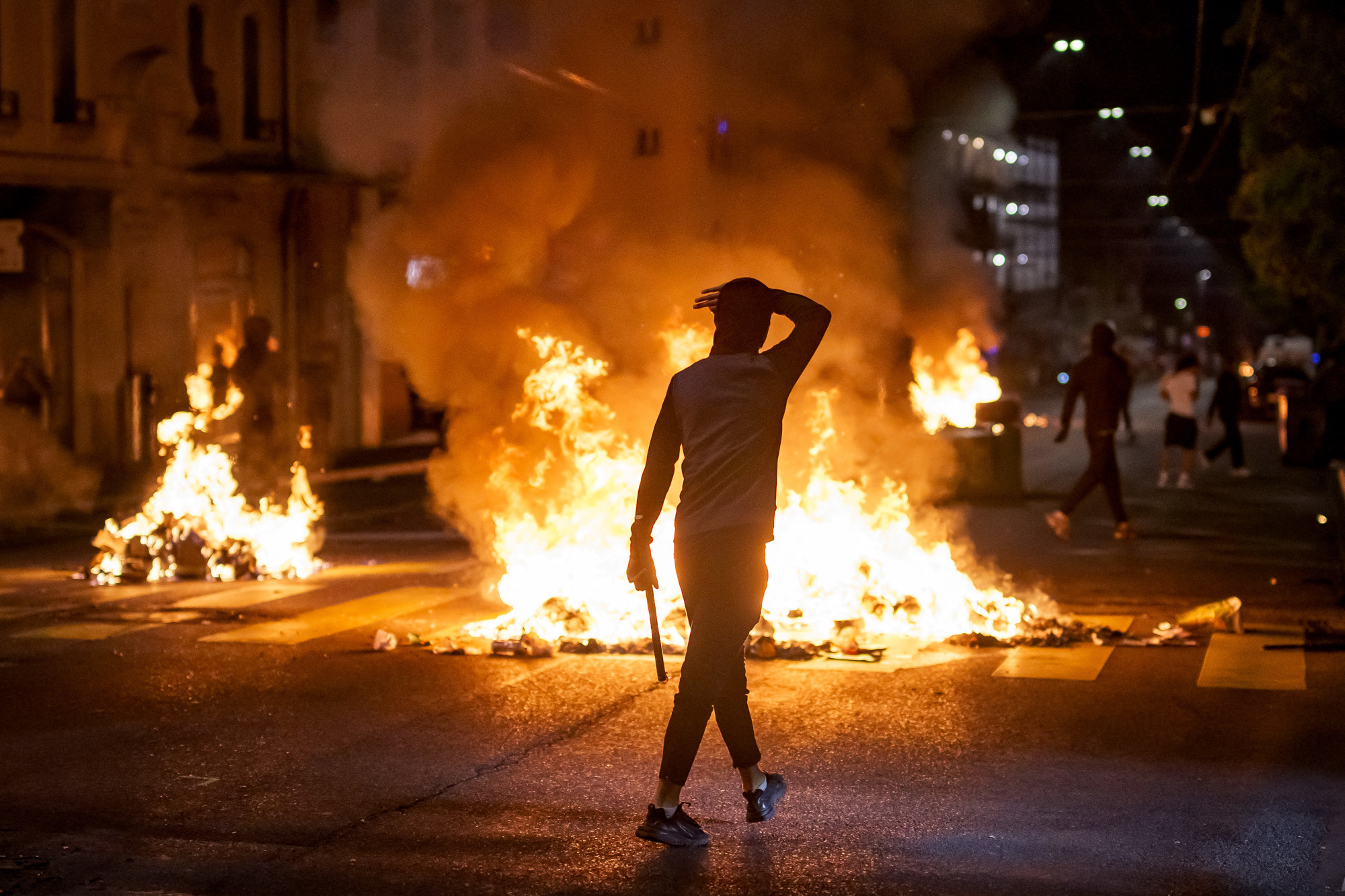A stolen scooter, a police chase, and a fatal crash left a 17-year-old of migrant background dead. Within hours, Lausanne erupted in the worst rioting Switzerland has seen in decades. Two nights of violence tore apart Switzerland’s image as a stable and quiet country. Masked youths, overwhelmingly black, took to the streets, setting bins alight, vandalising buses, and clashing with police using fireworks and stones. By the second night, more than 200 rioters clashed with Swiss police as tear gas clouded the air and water cannons roared through the city. It could very well have been a suburb of Paris or Lyon, but this was Lausanne, just along the lake from Geneva, in supposedly calm and orderly Switzerland.
Switzerland’s slide into violence can’t be explained away by colonial history. There is no Windrush generation, no Algerian legacy, no shared past with the Congo or the Maghreb
For decades, Switzerland seemed immune to the turmoil engulfing its neighbours. It has no colonial past, traditionally prided itself on tight immigration control, and stands outside the European Union. Yet the scenes in Lausanne tell a different story: anger spilling onto the streets, and clashes dominated by young men of migrant background. What was once seen as a uniquely French, British, German, Belgian or Swedish problem has reached Switzerland.
Lausanne is run by a left-leaning coalition of Socialists and Greens. It’s dominated by progressive politics and local authorities have embraced diversity policies. Over the past decade, Switzerland has accepted more than 200,000 refugees, including significant numbers from Eritrea, Somalia, Syria and Afghanistan, as well as other African and Muslim-majority countries. Tension with migrant communities is acute.
The left has accused the police of systemic racism, pointing to the recent suspension of four officers over racist WhatsApp messages. They suggest that policing is to blame for the violence. Lausanne’s Socialist mayor, Grégoire Junod, has promised sweeping reforms to rebuild public trust, acknowledging what he called a ‘systemic discrimination issue’ within the force. But this framing deflects attention from the failure of the country’s failed immigration policies. The teenager’s death was a spark in a tinderbox, and the riots have exposed just how fragile Switzerland’s social fabric has become.
Lausanne is not an isolated case and these are not the first such riots in Switzerland. No doubt they won’t be the last. In recent months, Zürich, Bern and Basel have all seen riots. In Bern, 11 police officers were injured during riots in June. In Zürich, masked groups fought running battles with police using tear gas and water cannons earlier this summer. Switzerland once looked on as France, Britain and Germany struggled with integration. Now the same tensions have surfaced in Switzerland too.
Switzerland’s slide into violence can’t be explained away by colonial history. There is no Windrush generation, no Algerian legacy, no shared past with the Congo or the Maghreb. For years, Switzerland marketed itself as the exception: outside the EU, controlling immigration tightly, shielded from the social tensions of its neighbours. Yet recently is has been shaped less by pragmatism than by ideology. The Swiss have championed diversity and inclusion while doing little to foster integration. The result is that the country now faces the same problems as Britain, France, and Germany.
Lausanne has embraced the full panoply of progressive causes: diversity workshops, inclusive language guidelines, anti-racism campaigns. Yet while officials previously celebrated Lausanne as a model of tolerance, migrant youths remain concentrated in districts like Prélaz, where unemployment, poor housing, and distrust of the police run deep. When tensions erupt, the same politicians who preach inclusion end up deploying water cannons and tear gas. Lausanne talked up harmony, but its streets now tell a different story.
For years, Switzerland’s political class reassured itself that these problems belonged elsewhere. French banlieues burned. Britain grappled with knife crime. Germany struggled with integration. Switzerland meanwhile congratulated itself on being different. Tolerant perhaps. But the images from Lausanne make that complacency look absurd. These riots show that Switzerland’s social model is not working.
Switzerland can continue to pretend that its reputation for order and cohesion is intact, blaming each riot on isolated incidents, in this case alleged police racism. Or it can face the harder truth – years of rapid immigration from countries with vastly different cultures and values have created profound social tension.
The stakes are about more than just social cohesion. Switzerland became rich and can only stay rich by being a haven of stability, attracting high net-worth individuals, business and investment from around the world. Images of running battles in the streets, with African migrants clashing with riot police, threaten the very model on which Switzerland built its prosperity.








Comments